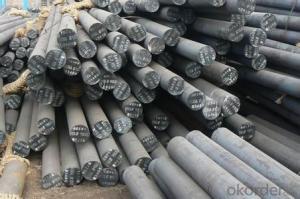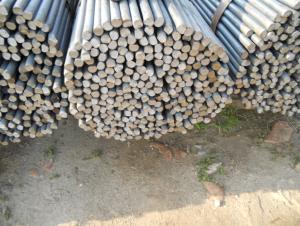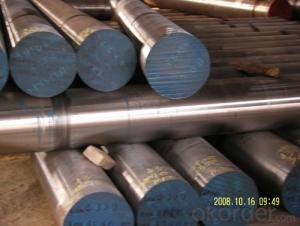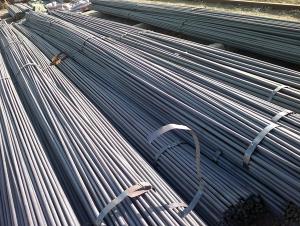cold round bar and gb
- Loading Port:
- China Main Port
- Payment Terms:
- TT OR LC
- Min Order Qty:
- -
- Supply Capability:
- -
OKorder Service Pledge
OKorder Financial Service
You Might Also Like
Product Description:
Specifications of Wire Rod Q235:
Steel Grade: Q235, Standard: GB Diameter: 5.5mm, 6.5mm, 7mm,8mm,9mm,10mm,12mm,14mm
Diameter Tolerance:±0.3mm 6.5mm can be drawing into 2mm/8.0mm can be drawing into 3mm
:
Please kindly find our chemistry of our material based on Q235 as below for your information
Trademark | Rank | Chemical composition (quality score) % | | ||||
C | Si | Mn | S | P | | ||
| | |||||||
| ≤ |
| ≤ | ≤ | | ||
Q235 | A | 0.14-0.22 | 0.30 | 0.30-0.65 | 0.050 | 0.045 | |
Q235 | B | 0.12-0.20 | 0.30 | 0.30-0.70 | 0.045 | 0.045 | |
Trademark | Rank | Pulling Test | | ||||
Bend PointΔs/Mpa | Tensile Strength | Elongation Ratioδ5% | | ||||
| | |||||||
Thickness (Diameter) /MM | Thickness (Diameter) /MM | | |||||
≤16 | 16-40 | | ≤16 | 16-40 | | ||
≥ | | ≥ | | ||||
Q235 | A | 235 | 225 | 375-500 | 26 | 25 | |
Q235 | B | 235 | 225 | 375-500 | 26 | 25 | |
Usage and Applications of Wire Rod Q235:
After hot-rolled the products shaped into coil and delivery as finished product, including round, square, rectangular, hexagonal and so on. Since most of the products are round, it is generally called wire rod. Carbon steel wire rod is widely used in construction and manufacturing. Carbon steel wire rod is mainly used for reinforcement of reinforced concrete and welded structure or reprocessed (roberts , nail, etc.) materials, especially used to produce wire drawing, welding electrode, nails, spring, electronic, precise machinery parts and so on.
Packaging & Delivery of Wire Rod Q235:
Packaging Detail: products are packed in coil and then shipped by container or bulk vessel
Each coil weight: 2-3MT
Delivery Detail: within 45 days after received deposit or LC.
Label: to be specified by customer, generally, each bundle has 1-2 labels
Trade terms: FOB, CFR, CIF
- Q: Can steel round bars be used for making gears or sprockets?
- Yes, steel round bars can be used for making gears or sprockets. Steel is a commonly used material for gears and sprockets due to its strength, durability, and ability to withstand high loads and friction. The round bars can be machined or shaped into the desired gear or sprocket design, providing a reliable and efficient solution for various applications.
- Q: Can steel round bars be used in the production of forgings?
- Yes, steel round bars can be used in the production of forgings. Steel round bars are commonly used as raw materials for forging processes. The round bars are heated to a specific temperature and then shaped using various forging techniques such as hammering, pressing, or rolling. The heat and pressure applied during the forging process help to enhance the mechanical properties of the steel, making it stronger and more durable. Steel round bars are ideal for producing forgings as they provide a consistent and uniform shape, ensuring the final product meets the required specifications. Additionally, steel round bars offer versatility in terms of size, grade, and composition, allowing for a wide range of applications in various industries such as automotive, aerospace, and construction.
- Q: What are the advantages of using titanium-alloy steel round bars?
- There are several advantages of using titanium-alloy steel round bars: 1. High strength: Titanium-alloy steel round bars have exceptional strength-to-weight ratio, making them ideal for applications where strength is crucial. Their high tensile strength allows them to withstand heavy loads and resist deformation. 2. Corrosion resistance: Titanium-alloy steel round bars exhibit excellent corrosion resistance, even in highly corrosive environments. This property makes them suitable for marine, aerospace, and chemical industries, where exposure to saltwater or chemicals is common. 3. Lightweight: Compared to other metal alloys, titanium-alloy steel round bars are relatively lightweight. This characteristic makes them advantageous in applications where weight reduction is important, such as in aerospace and automotive industries, as it allows for better fuel efficiency and increased payload capacity. 4. High temperature resistance: Titanium-alloy steel round bars can withstand high temperatures without losing their structural integrity. This property makes them suitable for applications in high-temperature environments, such as in power generation and oil and gas industries. 5. Biocompatibility: Titanium is a biocompatible material, meaning it is well-tolerated by the human body and does not cause adverse reactions. This makes titanium-alloy steel round bars suitable for medical implants, such as orthopedic implants and dental fixtures, where biocompatibility is critical. 6. Excellent fatigue resistance: Titanium-alloy steel round bars have exceptional fatigue resistance, which means they can withstand repeated loading and unloading without experiencing fatigue failure. This property makes them suitable for applications that require long-term durability and reliability, such as in structural components and machinery. Overall, the advantages of using titanium-alloy steel round bars lie in their high strength, corrosion resistance, lightweight nature, high temperature resistance, biocompatibility, and excellent fatigue resistance. These properties make them a versatile choice for various industries, ranging from aerospace and automotive to medical and petrochemical sectors.
- Q: Can steel round bars be used in the manufacturing of kitchenware?
- Yes, steel round bars can be used in the manufacturing of kitchenware. Steel is a durable and versatile material that is commonly used in the production of kitchen utensils and cookware. Steel round bars can be shaped and molded into various kitchenware items such as pots, pans, knives, spoons, and forks. The strength and heat resistance of steel make it suitable for cooking and food preparation purposes. Additionally, steel is easy to clean, hygienic, and resistant to corrosion, making it ideal for use in kitchenware.
- Q: What are the different surface treatments available for carbon steel round bars?
- There are several different surface treatments available for carbon steel round bars, each serving a specific purpose and offering unique benefits. Some of the most common surface treatments for carbon steel round bars include: 1. Galvanizing: This treatment involves applying a layer of zinc to the surface of the carbon steel round bar. Galvanizing provides excellent corrosion resistance and can significantly extend the lifespan of the steel. 2. Black oxide coating: Also known as blackening, this treatment creates a dark, uniform finish on the surface of the carbon steel round bar. Black oxide coatings offer mild corrosion resistance and can also provide improved lubricity and a decorative appearance. 3. Chromium plating: This treatment involves depositing a layer of chromium onto the surface of the carbon steel round bar, typically through electroplating. Chromium plating enhances the corrosion resistance of the steel and can also provide improved wear resistance and a polished appearance. 4. Nitriding: Nitriding is a heat treatment process that diffuses nitrogen into the surface of the carbon steel round bar, forming a hard and wear-resistant layer. This treatment improves the hardness and fatigue strength of the steel, making it suitable for applications that require enhanced durability. 5. Phosphating: Phosphating is a chemical treatment that converts the surface of the carbon steel round bar into a layer of phosphate crystals. This treatment provides excellent corrosion resistance and also enhances the adhesion of coatings or paints applied to the steel. 6. Powder coating: Powder coating involves applying a dry powder to the surface of the carbon steel round bar and then curing it under heat to form a protective coating. Powder coatings offer excellent corrosion resistance, durability, and can be customized in various colors and finishes. These are just a few examples of the surface treatments available for carbon steel round bars. The choice of treatment depends on the specific requirements of the application, such as corrosion resistance, wear resistance, aesthetics, and cost-effectiveness.
- Q: Can steel round bars be used for making fasteners or bolts?
- Certainly! The utilization of steel round bars is viable for the production of fasteners and bolts. Steel is widely employed as a material for these components due to its exceptional robustness, longevity, and resistance against corrosion. The round bars, crafted from steel, can be effortlessly manipulated and threaded, enabling the creation of an array of fasteners and bolts such as screws, nuts, and threaded rods. The selection of the precise steel grade hinges upon the specific application and desired strength properties. Nevertheless, it is imperative to bear in mind that the manufacturing process and stringent quality control are paramount in guaranteeing the dependability and performance of the end product.
- Q: Can steel round bars be used in the production of sporting goods?
- Yes, steel round bars can be used in the production of sporting goods. Steel is a durable and strong material that can provide stability and support for various sporting equipment such as weights, bars for weightlifting, poles for pole vaulting, or components for bicycles and golf clubs.
- Q: What are the different surface roughness options for steel round bars?
- The different surface roughness options for steel round bars can vary depending on the manufacturing process and specific requirements. Some common surface finishes for steel round bars include smooth, turned and polished, ground, and rough. These options provide different levels of smoothness and surface texture to meet various industrial and aesthetic needs.
- Q: Can steel round bars be used for gear applications?
- Yes, steel round bars can be used for gear applications. Steel round bars are often used for manufacturing gears due to their high strength, durability, and ability to withstand heavy loads and wear. They can be machined and heat-treated to meet specific gear requirements, making them a suitable choice for various gear applications in industries such as automotive, machinery, and manufacturing.
- Q: Can steel round bars be used for drive shaft applications?
- Yes, steel round bars can be used for drive shaft applications. Drive shafts are responsible for transmitting torque and rotational motion from the engine to the wheels or other components in various mechanical systems such as automobiles, industrial machinery, and even boats. Steel round bars possess excellent mechanical properties, including high strength, durability, and toughness, which are crucial for withstanding the stresses and loads imposed during operation. They also exhibit good fatigue resistance, allowing them to endure repeated loading cycles without failure. Furthermore, steel round bars can be accurately machined to meet the required dimensions and tolerances for drive shaft applications. They can be heat-treated to enhance their strength and hardness or surface treated to improve corrosion resistance if necessary. Overall, steel round bars are a popular choice for drive shaft applications due to their combination of strength, durability, and machinability, making them well-suited for transmitting power efficiently and reliably in various mechanical systems.
Send your message to us
cold round bar and gb
- Loading Port:
- China Main Port
- Payment Terms:
- TT OR LC
- Min Order Qty:
- -
- Supply Capability:
- -
OKorder Service Pledge
OKorder Financial Service
Similar products
Hot products
Hot Searches
Related keywords


























